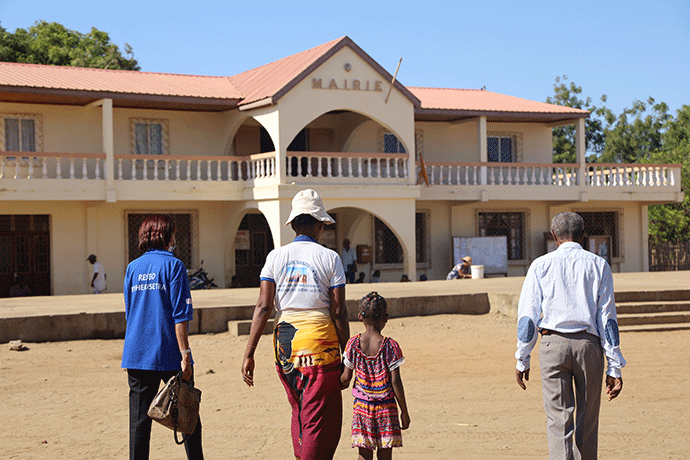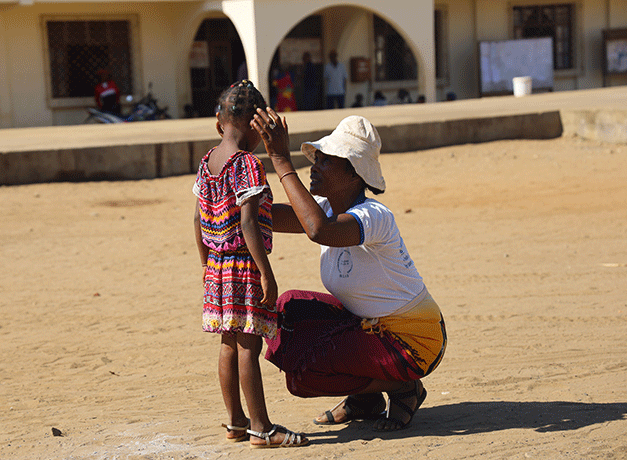News
Fighting for justice against gender-based violence in Madagascar
- 17 January 2022
News
GRAND SUD, Madagascar – ”I want to be a health worker when I grow up,” said 8-year-old Satiana Hary* shyly, twisting the edges of her knee-length gown. “Because I want to be able to treat myself if I fall sick.”
Sadly, little Satiana knows a lot about falling sick, and about violence too. She has recently endured advanced endometritis, vaginitis and cystitis – the repercussions of being raped by her neighbour, a man in his mid-twenties.
Satiana lives in Bekily, a district in the Androy region, in the Grand Sud of Madagascar. Usually an outgoing girl, she had become withdrawn and fearful. It was her grandmother, 52-year-old Soazizely Avo*, with whom she has lived since she was a baby, who noticed and raised the alarm. Wincing at the pain of the memory, she recalled, “There were some physical changes, too, and after checking her, I immediately feared the worst.”
Cases of gender-based violence, including rape, are tragically common in Madagascar: over 14 per cent of women have experienced sexual violence at some point in their lifetime, and more than a quarter have been subjected to physical or sexual violence by an intimate partner. These grim statistics only exacerbate the multitude of social problems faced by people in the Grand Sud area, especially women and girls. Years of successive droughts have weakened already scarce means of making a living, exposing the most vulnerable to yet more risks: Satiana was raped while out harvesting sugarcane.

Defiance and hope for change
In the past months, Ms. Avo has had to travel frequently from her native Bekily, one of the furthest districts, to Ambovombe, the main town of Androy region. The journey took a strenuous five hours on dusty roads, but she was steadfast in her resolve to seek justice and win back hope for her grandchild.
UNFPA supports the Listening and Legal Advice Centre in Ambovombe together with the Ministry of Population, Social Protection and Promotion of Women, bringing survivors’ cases to court and perpetrators to justice. With funding from Norway and the UN Central Emergency Response Fund, the centre is one of 26 across the island, of which half are located in the Grand Sud area where UNFPA’s humanitarian projects are focused. The centres offer comprehensive psychosocial and legal support to survivors, as well as medical care through referrals to hospitals and health facilities.
UNFPA works with the centre to follow up on cases, train new and current staff, distribute dignity kits to the vulnerable and provide support for vocational training on income-generating activities. This helps survivors to reclaim their dignity and be financially independent, so they can better protect themselves and their families.
Working together to end gender-based violence
A harrowing 1 in 3 women in Madagascar are reported to have experienced physical or sexual violence at some point in their lifetime, of whom three-quarters never report it or even try to seek assistance. In 2019, the government passed a law to strengthen the legal framework for preventing and prosecuting those accused of gender-based violence, as well as for compensating and protecting survivors.
Early one morning, stooping and half-kneeling close to her grandchild, Ms. Avo’s gaze rested on her granddaughter’s face. For a couple of minutes, she stared at her as if to suck out all the trauma from her young soul. Then she murmured some words of encouragement, reassuring Satiana that the dark moments were behind them.

The Ambovombe Court imposed a 10-year jail term and a fine of 5 million Ariary (roughly $1,260) on Satiana’s rapist. “I’ve been waiting for this day impatiently. Now we can go home and feel a bit safer”, Ms. Avo added with a smile. She is flanked by a social worker and the only lawyer with the Listening and Legal Advice Centre in Ambovombe, who has been at her side throughout the trial.
Satiana’s case brings to four the total number of resolved cases for sexual violence in 2021 by the Ambovombe Court, supported by the Listening and Legal Advice Centre. According to a UNFPA staff member working with the centre, judicial referrals for gender-based violence remain low despite awareness-raising efforts. “Most victims don’t file complaints, either due to their strong attachment to custom and tradition or because the perpetrators are often close family members.”
In 2020, the centre in Ambovombe alone supported 381 women and 20 men who had been subjected to gender-based violence. From 2018 to 2020, UNFPA assisted over 2.5 million survivors of gender-based violence in Madagascar, through essential services packages including referrals to health centres, training for income-generating activities, distributions of dignity kits and psychosocial and legal support.
----
*Names have been changed for privacy and protection